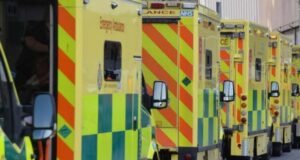
The six-day junior doctors’ strike is the longest period of industrial action by NHS workers in its history.
We were warned it would pose a “serious threat to patient safety”. One hospital even told staff the situation could become as difficult as it was during the first wave of Covid.
How does a hospital cope when a large proportion of its medics heads out of the door and onto the picket line?
On the first day of this strike, I went to a major teaching hospital to find out how it planned to cope in the days ahead.
It was clear managers had planned well for the strike, with more consultants and other more senior medics drafted in to cover.
The emergency department seemed to be running efficiently when I arrived, despite the strike and some staff sickness. But the general manager told me a “huge team effort” was under way to keep on top of demand for care, and manage “tight” capacity.
It was to be a challenging week ahead, but senior doctors on the whole seemed to support the industrial action by their junior colleagues.
That said, an obvious and growing sense of fatigue had set in. One consultant covering in the emergency department told me he expected to work 70 hours over the six days, by which time he would be “exhausted”.
“The workload is heavy and it’s complex. And we can only sustain it in short bursts, doing this complete, perpetual day and night cover,” he said.
As the ward and all its beds quickly filled up, he admitted the days ahead seemed “daunting”.
After many months of covering strike days, hospital consultants are, like many others, keen to see a settlement. As well as covering the wards and dealing with medical emergencies, they are having to perform surgery, and even manage discharges.
Delays in patients leaving hospital were likely to clog the system and create a shortage of beds for new arrivals, I was told.
 Weekly Bangla Mirror | Bangla Mirror, Bangladeshi news in UK, bangla mirror news
Weekly Bangla Mirror | Bangla Mirror, Bangladeshi news in UK, bangla mirror news







